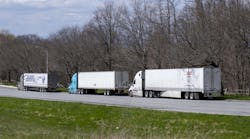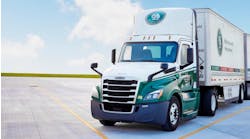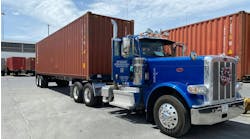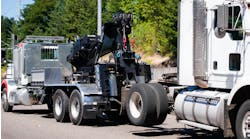The trucking industry has faced an inordinate amount of challenges in 2020, which sometimes feels like the the year to end all years. And it’s only halfway done. The good news is that The Truckload Carriers Association’s (TCA) Virtual Safety & Security Meeting Trucking Executive Panel, held June 23, had several insights to help fleets make it to 2021. The COVID-19 pandemic was the major area of focus, and was considered through the lenses of economy, safety and technology.
The discussion led by TCA President John Lyboldt included the wisdom and experience of four trucking executives: Dennis Dellinger, president & CEO of Cargo Transporters, Inc. (who is also chairman of the TCA); Dan Doran, president of Doran Logistics Services; Ed Nagle, president of Nagle Toledo, Inc.; and Dave Williams, executive vice president of Knight Transportation.
Here are some of the most critical insights [lightly edited for clarity]:
On driver safety behavior during the pandemic:
Williams said: “In my experience, when we're busy, we're safe. When we're slow, we tend to have more accidents. When a driver has something to do and is getting a good paycheck and everything's flowing, then all things are good and they usually stay very focused. But when they're worried about their paycheck, when they're not sure if they're going to get another load, when they have to wait around because there isn't a load to be had, when they finally do get that loan, sometimes they don't make the best decisions.”
Doran added: “When things are busy, drivers tend to run the same routes more often and get in a groove. When things slow down, things get kind of scrambled, you end up with drivers running to different locations that they wouldn't necessarily go to when things are busy, so they're a little less familiar with their surroundings.”
On disaster planning:
Williams: "The likelihood of having a pandemic was about the same as having a zombie apocalypse. It's just something our generation has never experienced before. So our planning was more hinged around things that we were familiar with— natural disasters, weather, tornadoes, hurricanes, earthquakes, things like that. For us, it was a matter of technology, being mobile, being able to take an office and shut it down and move it somewhere else. In that respect, we were ready for this.
"Now, obviously, there were some twists and turns and curve balls around health issues that we weren't ready for. We're going to have to now go back and tweak those emergency plans, but, fortunately, we had technology in place to help mitigate a lot of the impact."
On changes to technology adoption strategies during COVID-19:
Nagle said: "We haven't changed any of the way that we've incorporated technology into our fleet. We continue to embrace technology – adaptive cruise control and EBS [emergency braking systems] are standard, and we incorporate forward and rear cameras for a whole host of reasons. One of the things that we're really interested in is incorporating the artificial intelligence into the cameras, so that we see things predictably, instead of waiting for an event to trigger the camera.
"On the artificial intelligence component, I think what's really good is it gives you the ability to see some of those behaviors before the camera’s capturing event—anything from eating to texting and driving. We look at it as a behavior component. And how we can educate the drivers are as to why you don't eat when you're driving. That's what your half hour break is for.
"I want to know when our drivers are using their cell phones before an event occurs. We want to completely eliminate that."
Dellinger said: "We actually set on our purchases long before COVID, and we haven't changed our process or our mindset. We waited until May so we were able to get the Detroit Assurance 5.0. in those trucks. We had a little bit of delay because of the factory closing, but we did tag 10 trucks [already] and are planning to tag 10 more. We also decided on a capital campaign to equip all of our trucks with side cameras, and we are about 100 away from doing that. [Cargo Transporters has more than 525 trucks in its fleet.]
"We’ve also taken delivery of approximately 100 trailers. From a safety standpoint, we decided about five years ago to go with disc brakes on our trailer, so we want to continue that campaign. We've got another hundred delivered sometime in July."
Williams added: "I've not ever seen a time period where we've seen so much technology that has been introduced to us, and so it becomes challenging because it's not a matter of what works—it's what works best and what's most effective. It's cost prohibitive to go and just say I'm going to get everything. And so as an industry, we need to get really good at understanding where's the best bang for your buck? And what gives you the best return?"
On managing drivers during the pandemic:
Dellinger: "The key thing is awareness, trying to help [drivers] understand and not have some of the fears. Fortunately for our drivers, they're used to social distancing, with the exception of truck stops and restaurants and those facilities. We provided them with masks and hand sanitizer."
"Pre-COVID, we got involved with Pro-Tread for our safety training. And fortunately, they had a module about COVID-19 and our drivers participating in that program viewed that many times.
"In the early days, we saw a drop in our business here in North Carolina by about 40%. We furloughed 106 drivers, and we didn't go by seniority. We went to the people that had expressed concerns because of their families and it was actually on a voluntary basis. We're fortunate enough that by the end of May, that we had them all back to work."
Nagle: "Keeping our drivers and employees motivated is really a cultural thing. All of our drivers and all of our employees know through orientation to regular communications, how important our jobs are to the standard of living and for the quality of life that we as Americans have. The employees who gravitate to that type of mentality and thinking are really the ones that we hire here. And they take pride in their jobs. But really, it's our acknowledgement. It's a cultural thing about how critical trucking is to our way of life.
"We also did a hazard pay for six weeks, we increased their wages 8%. It had nothing to do with motivating them, it was really more of a sign and are part of the appreciation that we had because of everything that they’re working through. Most of our staff here, including myself, never quit coming into the office because we thought it was important for the drivers when they were here to see somebody who wasn't afraid. Then they were reassured out on the road."
On communication:
Williams: "We're learning through this pandemic that video calls are much more effective than we thought, whether it be with our drivers or whether it be with our office staff. We've been surprised how effective video calls have been. We're going to have to figure out how to use these tools in order to make us better at communicating, because one of our big struggles is our ability to really communicate well, especially with our driving associates. They're out on the road, it's hard to be in touch with them and understand their needs. Video calls have really upped our game in terms of being able to understand each other and resolve concerns. If we could have face-to-face meetings and everything that we did, I think it would be better. But this is what we've got."
Doran: "There are certain parts of this business that lend itself to this type of video conferencing, whether it be the sales, or the support, or the back-office people, but I still think that with operations people, there's no substitute for being in close proximity when things get busy."
On whether the economic recovery will be V, U or W-shaped:
Dellinger: "We may see the Nike swoosh and if I had a preference, I would rather see that than the W and definitely the U or W. I think the challenge we would have if we would go into a V recovery may be that we could end up with a labor issue. We did not have orientation for about 10 or 11 weeks. We just started up on June 3, so we have some trucks that are unseated at this time. If we roared back at 100%, we would not be able to service those customers we have. There will be drivers but it's having the right drivers in your equipment."
Williams: "Trucking’s economy isn't always directly tied to the general economy. It's a matter of capacity balance: When you have a lot of freight and and you don't have very many trucks, then the economy really needs you. If the amount of freight cannot change, but you add a bunch of trucks into the mix, all of a sudden, we're in bad shape, because we got 15 trucks chasing 10 loads. So, I think you have to look at both of those things, and then recognize that the general economy and the freight levels generated by the general economy, mostly through GDP, will have a large impact on our industry. But just as large, and maybe more significant, is the freight-truck balance and how that looks."




